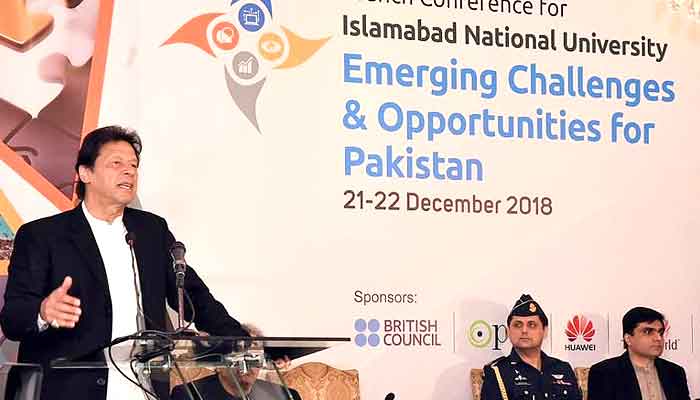What our future holds
On December 21, the PM House was opened to the public and a formal announcement was made at a special function, at which the prime minister was the chief guest, that the premises will be converted into an institute of advanced research, which will later become part of the Islamabad National University.
The institute will focus on four main priority areas: technology, governance, development and climate change. This represents a new milestone in the history of Pakistan as an ecosystem of knowledge and humility is being created. Only a genuine and selfless leader like Imran Khan could have accomplished this task, carrying on from his other illustrious achievements, including the Shaukat Khanum Memorial Hospital in Lahore and the Namal University in Mianwali.
The country owes him a debt of gratitude for releasing people from the clutches of the past evil barons who have drowned the nation in debt. Naya Pakistan must be a place in which the entire focus is on training our youth.
In his speech at the launch of the institute, Prime Minister Imran Khan acknowledged that the government was facing serious financial problems. However, he pledged that the billions of dollars which will be recovered from those who have looted and plundered the country over the decades will be set aside for education, especially higher education. This will surely have a transformative effect on our society.
Surely there are tough days ahead, as we struggle with the mountains of debt that surround us. But the nation must stand firm as we face these challenges and try to overcome them. The toughest challenges will be endured by the poor. In these times of distress, it is vital for people to share some of their wealth with those who are struggling to survive as the cost of living rises.
Pakistanis have always been generous. It is during the next two years that they must open their hearts and purses to those who are in need around them. There is a tough fight ahead to recover economically from the huge budgetary deficit that the incumbent government has inherited. But if we remain united, we will succeed.
In Naya Pakistan, the real challenge will be to establish a technology-driven knowledge economy. One of the fastest-growing areas of technology that students in Pakistan can benefit from is the field of artificial intelligence (AI). This field is predicted to have a similar impact on society as the advent of the internet did. The market is expected to more than double each year.
So, from 4.3 billion euros in 2017, it is expected to reach 21 billion euros by 2020 and rise to trillions of dollars in the subsequent decade. A huge demand has already arisen for trained manpower in this field. Pakistan can fulfil this demand if we set up a national programme to train hundreds of thousands of our brightest young people.
A high level of competence in mathematics is the prerequisite. Those children with an aptitude for mathematics should opt for advanced mathematics courses very early on at school so that they can take up software engineering, leading to a variety of projects in artificial intelligence, including data-centre capacity and services relating to machine-learning and cognitive computing.
The advent of quantum computers, which operate faster than normal computers, will further catalyse this growth. Universities in Europe and the US are already facing serious problems in finding highly-qualified faculty members to teach AI courses, as industry is hiring them at several-fold higher salaries.
Many countries in Europe have already dropped visa restrictions for migrants that are trained in AI. A grand battle to employ trained personnel in this field has already begun. It is now up to our Higher Education Commission (HEC) to sense the urgency and prepare the nation by sending at least 20,000 of our finest graduates for training abroad every year, particularly to top Chinese universities, so that they can become the founders of companies working in this field in Pakistan. Those who are sent to Europe and the US will be eagerly roped in by Western companies and may not contribute to our efforts for socioeconomic development. China is already a world leader in this field. So, we should start sending students to leading Chinese universities immediately.
In this connection, Prime Minister Imran Khan should announce a special programme of Rs50 billion annually to develop the required skills in AI in addition to the normal HEC programmes for human-resource development. To implement such a massive initiative, several key national institutions – including the HEC, the PAEC and the PARC – and top universities should join hands so that the selection and admission processes can be completed efficiently.
We can start earning between $10 billion and $30 billion annually within the next 10 years if we have the courage and foresight to make the required investments today. Students should be required to take advanced mathematics courses for a year and qualify through a national test before being sent abroad so that they can cope with the tough academic environment at foreign universities.
The prime minister has decided to form a national taskforce, chaired by him and co-chaired by a leading scientist in the country, on creating a technology-driven knowledge economy. This is a visionary step as it is aimed at benefitting from the country’s huge demographic advantage as we have some 100 million young people below the age of 20. If we can unleash this
creative potential through quality education, and investments in research on science, technology, innovation and entrepreneurship, then a bright future lies ahead.
However, the biggest hurdle in this challenge to create a knowledge economy is the system of governance. We need to follow the vision of Quaid-e-Azam Mohammed Ali Jinnah who had advocated a presidential system of democracy. His opinion has been reproduced in his own handwriting in ‘The Jinnah Anthology’ (Oxford University Press, page 81, edited by Liaquat Merchant and Sharif Al Mujahid).
Such a move will be hotly opposed by many political parties as the opportunity for corruption disappears if they cannot become federal ministers. This is where the role of the Supreme Court can be of critical importance in ensuring that the vision of Quaid-e-Azam Mohammed Ali Jinnah can be implemented in letter and spirit. This is the most pressing issue for suo-motu action as the very future of Pakistan is associated with it.
The writer is the former chairman of the HEC, and president of the Network of Academies of Science of OIC Countries (NASIC).
Email: ibne_sina@hotmail.com
-
 Kash Patel Fires FBI Officials Behind Trump Mar-a-Lago Documents Probe, Reports Say
Kash Patel Fires FBI Officials Behind Trump Mar-a-Lago Documents Probe, Reports Say -
 Martin Short's Daughter Katherine's Death Takes Shocking Turn As Terrific Details Emerge
Martin Short's Daughter Katherine's Death Takes Shocking Turn As Terrific Details Emerge -
 Patrick Dempsey Reacts To Tragic Death Of His 'Grey's Anatomy' Co-star Eric Dane
Patrick Dempsey Reacts To Tragic Death Of His 'Grey's Anatomy' Co-star Eric Dane -
 Sidney Crosby Injury News Shakes Penguins After Olympic Tournament
Sidney Crosby Injury News Shakes Penguins After Olympic Tournament -
 Yankees Honour CC Sabathia With No. 52 Retirement This September
Yankees Honour CC Sabathia With No. 52 Retirement This September -
 Cuban Government Says Boat Full Of Armed Men Fired On Border Guards, Killing 4
Cuban Government Says Boat Full Of Armed Men Fired On Border Guards, Killing 4 -
 Lily Collins Faces Intense Pressure After Landing Audrey Hepburn Role: Source
Lily Collins Faces Intense Pressure After Landing Audrey Hepburn Role: Source -
 FIFA World Cup Security Concerns Spike After Recent Cartel Violence In Mexico
FIFA World Cup Security Concerns Spike After Recent Cartel Violence In Mexico -
 Shamed Andrew Ordered To Curb Hobby: ‘It’s A Bad Look’
Shamed Andrew Ordered To Curb Hobby: ‘It’s A Bad Look’ -
 Cardi B 'no-nonsense' Move: Why She Distanced Herself From Stefon Diggs? Source
Cardi B 'no-nonsense' Move: Why She Distanced Herself From Stefon Diggs? Source -
 Metallica Announce 2026 ‘Life Burns Faster’ Las Vegas Sphere Residency
Metallica Announce 2026 ‘Life Burns Faster’ Las Vegas Sphere Residency -
 ‘From Dating Scams To Fake Lawyers’: OpenAI Bans ChatGPT Accounts Over Misuse
‘From Dating Scams To Fake Lawyers’: OpenAI Bans ChatGPT Accounts Over Misuse -
 Amy Schumer Reveals She Pushed Through Illness Mid-performance: 'Proud I Made It'
Amy Schumer Reveals She Pushed Through Illness Mid-performance: 'Proud I Made It' -
 Shamed Andrew Can No Longer Take The ‘heat’ Of His Actions
Shamed Andrew Can No Longer Take The ‘heat’ Of His Actions -
 Royals Adamant To Show Andrew Is ‘just One Bad Apple’
Royals Adamant To Show Andrew Is ‘just One Bad Apple’ -
 Jessie Buckley Reveals Why BAFTA Win Felt Extra 'special' With Cillian Murphy
Jessie Buckley Reveals Why BAFTA Win Felt Extra 'special' With Cillian Murphy




